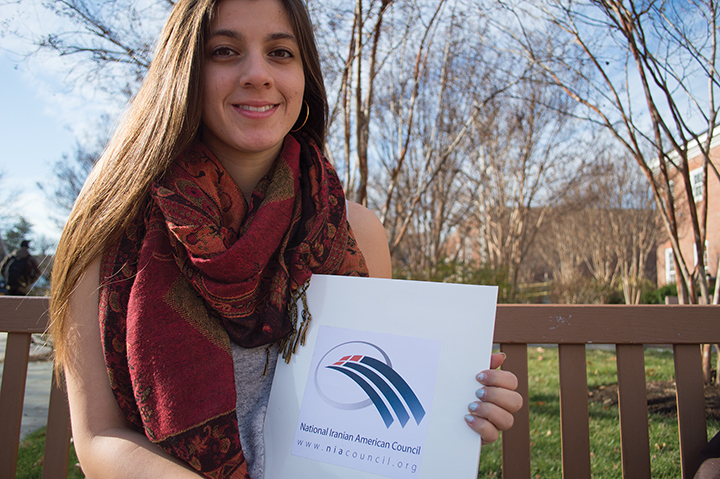
Yosmin Badie, a member of a local National Iranian American Council chapter, wants students to petition against additional U.S. sanctions on Iran.
Kamran Partovi brought a suitcase full of medicine when he visited his family in Iran last winter break.
“My grandmother is a dialysis patient; she’s been on dialysis for almost 20 years, maybe even more, and for patients like her, it’s very difficult to find medication,” the sophomore government and politics major said.
Limited access to goods such as medicine is a result of the economic sanctions the U.S. has imposed on Iran for decades, Partovi said. But in late November, the U.S., Iran and five other world powers — the United Kingdom, France, Russia, China and Germany — struck a deal to give Iran more than $6 billion in sanctions relief in exchange for stopping parts of its nuclear program. Now, some U.S. lawmakers, including Rep. Steny Hoyer (D-Md.), are debating proposing new sanctions — restrictions that some Iranian-American students at this university said would be detrimental to the Iranian people.
Since Hoyer represents parts of Prince George’s County, Iranian-American students at this university have the potential to make a difference by voicing their opinions, said sophomore government and politics major Yosmin Badie.
The sanctions have hurt Badie’s family members in Iran, she said. Though Badie was born in the U.S., almost all of her aunts, uncles and cousins still live in the Middle Eastern country.
So as part of the Prince George’s County chapter of the National Iranian American Council, Badie sent an email to the university’s government and politics listserv Monday asking students to sign a petition opposing the possible new sanctions. About 10 to 15 students at this university are part of that chapter, she said.
“I’ve always wanted to kind of find a way to help, but I’ve always felt hopeless,” Badie said. “Hearing about National Iranian American Council and their campaign kind of gave me hope and made me realize that I could do something to affect the situation.”
In her email, Badie asked for people who support lifting sanctions and increasing diplomacy to send in their signatures to be presented to Hoyer. The chapter’s goal is 75 signatures, and so far, her message has generated 24, she said.
She sent out the message without permission, however, and some students thought it was too politically charged to go out to students.
“[It was] inappropriate for a student to use a school-sponsored academic forum for their political views,” said sophomore finance major Ryan Crowder.
But the students in the chapter will continue their efforts, Badie said, campaigning by talking to students outside McKeldin Library and other campus locations.
The national debate includes concerns that lifting sanctions against Iran might indirectly support the nation’s nuclear capability. But though Badie opposes Iran having nuclear arms, she doesn’t think imposing sanctions will help.
Instead, she supports the November deal that relieved some international sanctions in exchange for working to minimize Iran’s nuclear program, which includes diluting its supply of uranium, which can become fuel for a nuclear weapon, halting construction of any new nuclear facilities and increasing outside observation of its nuclear program.
Still, some said the temporary sanctions deal provided only minimal relief.
“[Iran is] getting access [to] financial benefits that they otherwise didn’t have, but there are still a lot of sanctions in place,” said Nancy Gallagher, Center for International and Security Studies associate director of research. “So this is pretty small compared to what’s still in place.”
But others, including Sen. Robert Menendez (D-N.J.), Senate Foreign Relations Committee chairman, think lifting sanctions on a country with nuclear capability is a risk to the international community.
For Badie and her family members in Iran, she said the deal is a step forward. And increasing sanctions would be a human rights issue, she said, leading to her campaign for more signatures to sway Hoyer’s decision.
“Every signature counts because it shows Hoyer that this is a vote in his district that will be affected by his decision to either impose sanctions or vote for them,” Badie said. “That will really make a difference.”



